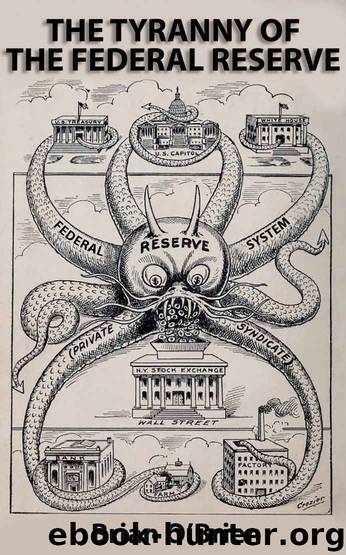The Tyranny of the Federal Reserve by Brian O'Brien

Author:Brian O'Brien [O'Brien, Brian]
Language: eng
Format: epub, azw, pdf
Published: 2015-07-01T05:00:00+00:00
The Tyranny of Free Trade
Income tax. Property tax. Sales tax. Utility tax. Gasoline tax. Capital gains tax. Estate tax. Air transportation tax. Luxury tax. Telephone tax. Gift tax. Dog license tax. Fishing license tax. The list goes on and on and has been growing year after year.
In 1913, the U.S. federal tax code was 400 pages long. By 2013, it had grown to 73,954 pages.
For a nation that was essentially founded because of a tax rebellion, we have become one of the most taxed peoples on Earth.
Taxes have become so onerous that at the time of this writing there has been a surge of individuals giving up American citizenship due to the American tax burden. American companies are leaving our shores for foreign ones to avoid paying taxes here.
The taxman loves to tax us. If you drive a car, he'll tax the street. If you try to sit, he'll tax your seat. If you get too cold, he'll tax the heat. If you take a walk, he'll tax your feet. So sang the Beatles.
But there is one tax that our current leaders actually hate. They recoil from it. If it is brought up in discussion, they will react with defensiveness and insults. They become indignant at the mere mention of it. The tax they hate is one that the Founders explicitly granted the federal government the power to collect to pay the government's debts and provide for the common defense and general welfare of the United States.
Article I, Section 8, Clause 1 of the Constitution states: The Congress shall have power to lay and collect taxes, duties, imposts and excises, to pay the debts and provide for the common defence and general welfare of the United States; but all duties, imposts and excises shall be uniform throughout the United States...
Excises are sales taxes while duties and imposts are tariffs. The Constitution does not list the income tax as one of the taxes the federal government is granted to collect as one of its enumerated powers. But the tariff was named as a tax that was to be used to generate government income.
Following American independence, tariffs were the main source of government revenue. Rancorous and divisive debate in Congress over tariffs raged for much of the first half of the 19th century. The industrializing North was largely pro-tariff while the slave-based plantation economy of the South was largely anti-tariff. With the election of President Abraham Lincoln, pro-tariff forces became dominant and the United States followed a protectionist trade policy for the second half of the 19th century. For half a century, American industry and the wages of American workers were protected from foreign competition behind a high tariff wall.
The stated purposes of the tariff were to promote American industry, protect the American high-wage structure versus the pauperized wage structure of Europe and generate government revenue.
In 1741, Benjamin Franklin wrote an essay called Observations Concerning the Increase of Mankind, Peopling of Countries, etc. The essay was about what causes the population of a nation to increase or decrease.
Download
The Tyranny of the Federal Reserve by Brian O'Brien.azw
The Tyranny of the Federal Reserve by Brian O'Brien.pdf
This site does not store any files on its server. We only index and link to content provided by other sites. Please contact the content providers to delete copyright contents if any and email us, we'll remove relevant links or contents immediately.
International Integration of the Brazilian Economy by Elias C. Grivoyannis(110071)
The Radium Girls by Kate Moore(12018)
Turbulence by E. J. Noyes(8040)
Nudge - Improving Decisions about Health, Wealth, and Happiness by Thaler Sunstein(7692)
The Black Swan by Nassim Nicholas Taleb(7106)
Rich Dad Poor Dad by Robert T. Kiyosaki(6612)
Pioneering Portfolio Management by David F. Swensen(6288)
Man-made Catastrophes and Risk Information Concealment by Dmitry Chernov & Didier Sornette(6005)
Zero to One by Peter Thiel(5786)
Secrecy World by Jake Bernstein(4741)
Millionaire: The Philanderer, Gambler, and Duelist Who Invented Modern Finance by Janet Gleeson(4465)
The Age of Surveillance Capitalism by Shoshana Zuboff(4275)
Skin in the Game by Nassim Nicholas Taleb(4239)
The Money Culture by Michael Lewis(4198)
Bullshit Jobs by David Graeber(4179)
Skin in the Game: Hidden Asymmetries in Daily Life by Nassim Nicholas Taleb(3989)
The Dhandho Investor by Mohnish Pabrai(3759)
The Wisdom of Finance by Mihir Desai(3734)
Blockchain Basics by Daniel Drescher(3574)
